
A courtesy call is a call or visit made out of politeness. [1] It is usually done between two parties of high position such as a government official to meet and briefly discuss about important or concerning matters.

A courtesy call is a call or visit made out of politeness. [1] It is usually done between two parties of high position such as a government official to meet and briefly discuss about important or concerning matters.
In diplomacy, a courtesy call is a formal meeting in which a diplomat or representative or a famous person of a nation pays a visit out of courtesy to a head of state or state office holder. Courtesy calls may be paid by another head of state, a prime minister, a minister (Government), or a diplomat. The meeting is usually of symbolic value and rarely involves a detailed discussion of issues. [2]
A newly appointed head of mission will usually make a courtesy call to the receiving foreign minister, head of government, and often other dignitaries such as the local mayor. It is also customary for a new head of mission to make courtesy calls to other heads of missions in the capital and often to receive return courtesy calls. Neglecting to pay a courtesy call to missions of smaller countries may result in them resenting the newly arrived mission head. Upon the departure of a head of mission, an additional round of courtesy calls is often expected. [3] Fulfilling this protocol obligation is a time consuming task, with one diplomat noting it took him five months to complete a round in Washington DC. [4]
Diplomatic convention states courtesy calls last 20 minutes, which is some cases is excessive with both sides searching frantically for what to say, though some ambassadors consult an encyclopedia prior to the call to prepare talking points. In other cases, in which the meeting sides have joint items to discuss, a call may last an hour or two. Diplomatic personnel are split on the value of courtesy calls, some seeing them as a time wasting tradition while others see them as a means to secure a valuable introduction. In some cases, it is possible to arrange a joint courtesy call by visiting a senior ambassador who will, by prearrangement, assemble his regional colleagues for the meeting. [5]
Courtesy calls to cabinet members and members of parliament or congress are important and may lay the foundation for a continuing relationship. In Western democracies, ambassadors will pay calls to leaders of minor and major opposition parties as a change of government may occur at a future point. Such calls are important, and the ambassador must take care to cultivate the opposition without offending the incumbents. Calls to civic dignitaries of major cities, newspaper editors, and trade unions are also performed. [5]
Naval courtesy calls were common in the 19th century. [6] The American Great White Fleet paid a series of courtesy calls to ports around the world in a show of American naval strength in 1907–1909. [7]
United States Navy regulations require that (upon joining a new ship or station) an officer must make a courtesy call to his new commanding officer or commandant within 48 hours after joining. [8]
In business, a courtesy call is a visit or call from a company to customers for the purposes of gauging satisfaction or to thank them for their patronage. [9]

A diplomatic mission or foreign mission is a group of people from a state or organization present in another state to represent the sending state or organization officially in the receiving or host state. In practice, the phrase usually denotes an embassy or high commission, which is the main office of a country's diplomatic representatives to another country; it is usually, but not necessarily, based in the receiving state's capital city. Consulates, on the other hand, are smaller diplomatic missions that are normally located in major cities of the receiving state. As well as being a diplomatic mission to the country in which it is situated, an embassy may also be a nonresident permanent mission to one or more other countries.
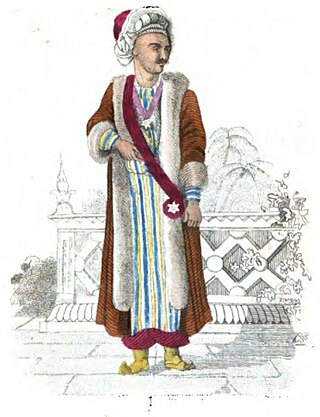
An ambassador is an official envoy, especially a high-ranking diplomat who represents a state and is usually accredited to another sovereign state or to an international organization as the resident representative of their own government or sovereign or appointed for a special and often temporary diplomatic assignment. The word is also used informally for people who are known, without national appointment, to represent certain professions, activities, and fields of endeavor, such as sales.

A diplomat is a person appointed by a state, intergovernmental, or nongovernmental institution to conduct diplomacy with one or more other states or international organizations.
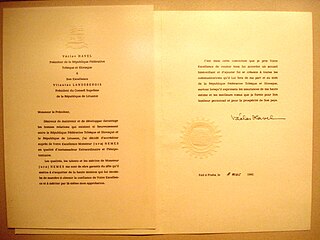
A letter of credence is a formal diplomatic letter that designates a diplomat as ambassador to another sovereign state. Commonly known as diplomatic credentials, the letter is addressed from one head of state to another, asking them to give credence to the ambassador's claim of speaking for their country. The letter is presented personally by the ambassador-designate to the receiving head of state in a formal ceremony, marking the beginning of the ambassadorship.
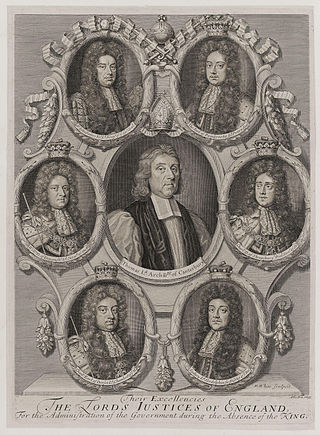
Excellency is an honorific style given to certain high-level officers of a sovereign state, officials of an international organization, or members of an aristocracy. Once entitled to the title "Excellency", the holder usually retains the right to that courtesy throughout their lifetime, although in some cases the title is attached to a particular office and is held only during tenure of that office.

A state visit is a formal visit by a head of state to a foreign country, at the invitation of the head of state of that foreign country, with the latter also acting as the official host for the duration of the state visit. Speaking for the host, it is generally called a state reception. State visits are considered to be the highest expression of friendly bilateral relations between two sovereign states, and are in general characterised by an emphasis on official public ceremonies.
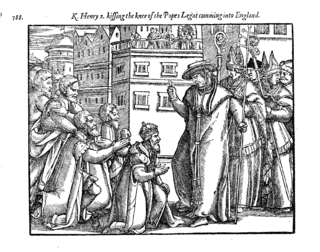
A papal legate or apostolic legate is a personal representative of the Pope to foreign nations, to some other part of the Catholic Church, or representatives of the state or monarchy. He is empowered on matters of Catholic faith and for the settlement of ecclesiastical matters.
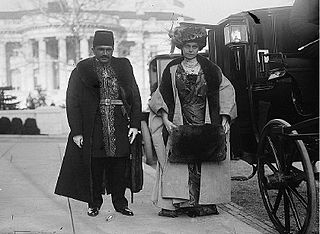
A chargé d'affaires, plural chargés d'affaires, often shortened to chargé (French) and sometimes in colloquial English to charge-D, is a diplomat who serves as an embassy's chief of mission in the absence of the ambassador. The term is French for "charged with business", meaning they are responsible for the duties of an ambassador. Chargé is masculine in gender; the feminine form is chargée d'affaires.
Diplomatic rank is a system of professional and social rank used in the world of diplomacy and international relations. A diplomat's rank determines many ceremonial details, such as the order of precedence at official processions, table seatings at state dinners, the person to whom diplomatic credentials should be presented, and the title by which the diplomat should be addressed.

Diplomatic correspondence is correspondence between one state and another and is usually of a formal character. It follows several widely observed customs and style in composition, substance, presentation, and delivery and can generally be categorized into letters and notes.
A permanent representative is a diplomat who is the head of a country's diplomatic mission to an international organisation.
Diplomatic illness is the practice amongst diplomats and government ministers of feigning illness, or another debilitating condition, to avoid engaging in diplomatic or social engagements. The excuse of ill-health is designed to avoid formally offending the host or other parties. The term also refers to the period during which the "diplomatic illness" is claimed to persist.
A deputy chief of mission is the number-two diplomat assigned to an embassy or other diplomatic mission. The deputy chief of mission is usually considered the second-in-command to the head of mission. DCMs serve as chargé d'affaires when the titular head of mission is outside the host country or when the post is vacant.

The Ministry of Foreign Affairs is the governmental body responsible for conducting foreign relations of the Republic of Turkey. The Ministry is responsible for Turkey's diplomatic missions abroad and for the promotion of Turkish culture, as well as for implementing the country's foreign policy in accordance with its national interests. Established on 2 May 1920, its primary duties are administering diplomatic missions, negotiating international treaties and agreements, and representing the Republic of Turkey at the United Nations. The ministry is headquartered in the Turkish capital of Ankara and counts on more than 200 missions as embassies, permanent representation offices and consulates general, abroad. As of 2021, the Ministry of Foreign Affairs maintains 235 diplomatic posts worldwide. The current Minister of Foreign Affairs is Hakan Fidan, who has held the position since 3 June 2023.
An envoy extraordinary and minister plenipotentiary, usually known as a minister, was a diplomatic head of mission who was ranked below ambassador. A diplomatic mission headed by an envoy was known as a legation rather than an embassy. Under the system of diplomatic ranks established by the Congress of Vienna (1815), an envoy was a diplomat of the second class who had plenipotentiary powers, i.e., full authority to represent the government. However, envoys did not serve as the personal representative of their country's head of state. Until the first decades of the 20th century, most diplomatic missions were legations headed by diplomats of the envoy rank. Ambassadors were only exchanged between great powers, close allies, and related monarchies.

The Israeli Ministry of Foreign Affairs is one of the most important ministries in the Israeli government. The ministry's role is to implement Israel's foreign policy, and promote economic, cultural, and scientific relations with other countries.

Diplomacy comprises spoken or written communication by representatives of state, intergovernmental, or nongovernmental institutions intended to influence events in the international system.
The Diplomatic Service of the Republic of Lithuania is the part of the governmental service tasked with enforcing the foreign policy set by the President, the Parliament, and the Government of the Republic of Lithuania. The head of the service is the Foreign Minister.
A diplomatic flag is a flag used by a sovereign state engaging in diplomacy which is different from the nation's normal national flag. Some nations also have personal flags that are used by their diplomatic representatives, such as the U.S. Foreign Service flags.

The Chief of Protocol (CoP) is a government official who heads the protocol department of a state, overseeing security, logistics and etiquette in diplomatic and national functions. A protocol department decides on diplomatic immunity and privileges, diplomatic host security, diplomatic use of airspace and it is the guardian of official etiquette. Advance protocol teams, usually headed by the Chief of Protocol, engage as first contact between governments for the planning of bilateral and multilateral summits and visits.